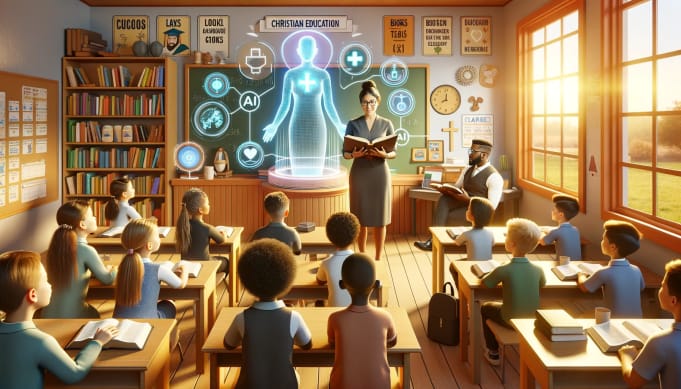AI can personalize learning for children in Sunday School by tailoring lessons to their individual learning paces. Imagine a Sunday School curriculum that adapts to each child’s unique understanding and pace—what a difference it could make!
"Start children off on the way they should go, and even when they are old they will not turn from it." — Proverbs 22:6
AI can be used to deliver interactive Bible lessons that engage children better than traditional methods. For example, AI could create Bible story animations that change based on the child's choices, helping them to immerse in the narrative. Additionally, AI-driven quizzes can assess children's understanding of Bible stories and concepts, providing instant feedback and tailored suggestions for further study.
We must, however, be vigilant to ensure these tools are theologically sound. It’s essential to have theologians and educators collaborate to create the content fed into these AI systems, ensuring it aligns with biblical truths and teachings.
Resources for Curriculum Development
Here are some tools and techniques:
- Adaptive Learning Platforms: Tools like DreamBox Learning or Smart Sparrow can be adapted for Sunday Schools by integrating Bible story lessons and quizzes.
- AI-Driven Visual Storytelling: Tools like Toonly or Animaker can create biblical story animations tailored to varying age groups.
Personalized Bible College Courses

For Bible colleges and seminaries, AI can customize course materials to fit students' needs. No more one-size-fits-all syllabi; instead, students can receive materials that cater to their strengths and areas of improvement.
Imagine an AI system that records each student's progress, understanding, and areas of difficulty in their study of biblical languages. The system could offer extra exercises or different teaching materials to address gaps in understanding, or it might suggest advanced resources for topics the student excels in.
Implementing Personalization in Bible Colleges
Here are practical steps on leveraging AI for personalizing Bible college courses:
- Data Collection: Use Learning Management Systems (LMS) like Moodle or Canvas that can house AI algorithms to track and analyze student performance.
- Tailored Content Delivery: Platforms like Coursera or edX have AI-enhanced course customization features that can be adapted for theological studies.
- Feedback and Assessment: AI-driven assessment tools like Gradescope can efficiently evaluate students' work and provide personalized feedback.
Training and Supporting Lay Teachers with AI

One of the most exciting applications of AI is in supporting lay teachers. With AI tools, even those with limited theological training can offer high-quality, biblically accurate lessons.
"Whatever you do, work at it with all your heart, as working for the Lord, not for human masters." — Colossians 3:23
Transform Your Ministry with AI (Save 10+ Hours Weekly!)
Effortlessly create stunning graphics, videos & audio, reach more people with translation, and streamline tasks. Elevate your church's impact – no tech expertise needed!
Download NowAI tools can provide lesson plans, sermon outlines, and even full-fledged theological insights. This is particularly essential in smaller congregations where resources are limited. AI can help democratize access to rich, well-researched Christian teaching materials, allowing lay teachers to effectively lead Bible studies and Sunday school sessions.
Practical AI Tools for Lay Teachers
Some tools that could benefit lay teachers include:
- OpenAI's GPT-based Models: These can generate sermon outlines or Bible study guides based on specified Bible passages.
- Logos Bible Software: Offers detailed theological databases with AI-powered research tools to help lay teachers prepare lessons.
- FaithGPT: A customized AI tool that provides theological insights and can assist in creating lesson plans.
Interactive Biblical Simulations

Interactive AI simulations can bring biblical stories to life, making them more relatable and easier to understand. Imagine walking through ancient Jerusalem or participating in the events of the Exodus—all from your classroom.
Biblical simulations powered by AI can offer experiences such as virtual reality tours of biblical sites or interactive scenarios from the Bible where learners can understand the context, culture, and happenings of the time.
Enhancing Biblical Studies with Simulations
- Virtual Reality (VR) Platforms: VR platforms like Oculus Rift can be customized for biblical simulations, providing immersive educational experiences.
- Interactive Models: Tools like Unity 3D can create interactive models of ancient biblical settings for educational purposes.
- Narrative Simulations: AI-driven narrative generation tools like StoryScape can create dynamic Bible story scenarios for learners to interact with.
Balancing Traditional and AI-Assisted Learning Methods

The key is balance. AI should complement, not replace, traditional methods of Christian education. While AI can provide personalized insights, it cannot replicate the emotional and communal aspects of learning within a church community.
AI can handle repetitive tasks like grading quizzes or tracking attendance, allowing teachers to focus on spiritual mentorship and building relationships. Consistent involvement of human educators ensures personal interaction, accountability, and discernment, which are crucial for spiritual formation.
Strategies for a Balanced Approach
- Hybrid Lesson Plans: Combine AI-driven tools with teacher-led discussions and group activities.
- Regular Reviews: Routinely evaluate the AI tools and their impact on students with feedback from both students and teachers.
- Integration: Use AI for automation (grading, personalized homework) but maintain traditional methods for interactive activities and personal mentoring.
Assessing Spiritual and Biblical Knowledge

AI tools can help assess students' spiritual and biblical knowledge more accurately. These tools provide detailed feedback that helps both learners and teachers understand areas needing more focus.
"For the Spirit God gave us does not make us timid, but gives us power, love and self-discipline." — 2 Timothy 1:7
Assessments driven by AI can generate quizzes tailored to individual learning levels and track progress over time. The AI algorithms can analyze results to offer teachers insights into each student's strengths and weaknesses. This insight enables teachers to offer targeted guidance and support, ensuring a comprehensive understanding of biblical teachings.
Implementing AI-Driven Assessments
- Adaptive Quizzing Platforms: Tools like AdaptiveU or Quizlet can be adapted to suit theological education, offering quizzes that adjust according to student performance.
- Detailed Analysis: AI-driven platforms like Khan Academy adapt their difficulty based on the student's responses, which can be mirrored for Bible quizzes.
- Progress Tracking: Incorporate systems like Google Classroom that use AI to track and report student progress effectively.
Building AI-Enhanced Continuing Education Programs
Steps to integrate AI into continuing education for ministers:
- Course Personalization: Use platforms that allow the creation of personalized courses based on individual needs, such as Udemy for Business.
- Networking and Collaboration: AI-driven platforms like Slack or LinkedIn can facilitate connections and collaboration among ministers.
- Professional Development Tools: Utilize AI-driven professional development platforms like Degreed or Pluralsight that tailor learning paths based on the user's progress and interests.
Addressing Concerns About AI in Christian Education

Of course, concerns about AI's role in education are valid. It's essential to address these concerns head-on to ensure AI is used responsibly and ethically.
"Therefore, my dear brothers and sisters, stand firm. Let nothing move you. Always give yourselves fully to the work of the Lord, because you know that your labor in the Lord is not in vain." — 1 Corinthians 15:58
Parents and educators may worry about AI diminishing the human aspects of faith education. They fear that prioritizing technology might lead to a loss of personal connection and potentially expose students to unvetted theological content.
Mitigating Concerns Effectively
- Parental Involvement: Ensure parents can monitor and engage with the AI-driven educational content being used.
- Theological Oversight: Have a board of theologians and educators review AI tools regularly to ensure their content remains biblically accurate.
- Balancing Tech and Tradition: Maintain a hybrid approach, combining the efficiency of AI with the warmth of personal interactions.
Preparing Students for Faith Challenges in an AI World

AI can help prepare students to navigate faith challenges in a world increasingly influenced by technology. It’s about equipping them with tools to defend their faith and grow spiritually amidst a tech-driven landscape.
Modern society's digital landscape presents numerous challenges to maintaining and defending one's faith. AI can provide students with apologetics resources, digital Bible study companions, and real-time support in understanding and defending their beliefs.
"Always be prepared to give an answer to everyone who asks you to give the reason for the hope that you have. But do this with gentleness and respect." — 1 Peter 3:15
Equipping Students Against Modern Challenges
- AI Companions: AI-driven applications like chatbots can simulate common faith-challenging scenarios, helping students formulate their responses.
- Apologetics Tools: Platforms like Bible Gateway and Blue Letter Bible can be integrated with AI to provide instant access to apologetic resources.
- Real-Time Support: Chatbot applications similar to FaithGPT can offer real-time scripture references and theological insights.
Ethical Considerations in AI-Driven Religious Instruction

Ethical considerations are paramount when integrating AI into Christian education. From ensuring data privacy to maintaining theological accuracy, it's crucial to keep ethical boundaries in check.
"What does the Lord require of you? To act justly and to love mercy and to walk humbly with your God." — Micah 6:8
Ensuring AI ethics means addressing potential biases in AI algorithms, ensuring data privacy, and constantly monitoring the alignment of AI outputs with biblical teaching. We must rigorously audit AI tools to ensure they are transparent, unbiased, and used in accordance with Christian values.
Establishing Ethical Guidelines
- Transparency: Educators and students need to be aware of how AI tools operate and the source of their content.
- Data Protection: Implement robust data protection measures to keep personal and educational data secure.
- Regular Audits: Conduct frequent reviews of AI tools to ensure their outputs conform to biblical standards and ethical guidelines.
Conclusion: AI as a Complement, Not a Replacement
Ultimately, AI offers a host of opportunities to enhance Christian education. However, it's critical to remember that AI is a tool, not a replacement for the irreplaceable human aspects of spiritual teaching and community building.
"Let us consider how we may spur one another on toward love and good deeds, not giving up meeting together, as some are in the habit of doing, but encouraging one another—and all the more as you see the Day approaching." — Hebrews 10:24-25
FAQs
Q: Can AI replace pastors or spiritual leaders? A: Absolutely not. AI can assist but never replace the unique role of pastors and spiritual leaders who provide human connection and spiritual guidance.
Q: Is it ethical to use AI in religious settings? A: Yes, as long as it is used responsibly, ethically, and biblically. Ensuring data privacy and maintaining theological accuracy are crucial.
Q: How can AI benefit my children's Sunday School education? A: AI can personalize lessons to match your child's learning pace and understanding, making Bible study more engaging and effective.
Q: Does AI have a place in adult theological education? A: Yes, AI can provide tailored resources and continuous learning opportunities for those in ministry and theological education programs.
If you have more questions or insights, feel free to reach out in the comments below or probe the additional resources mentioned!

